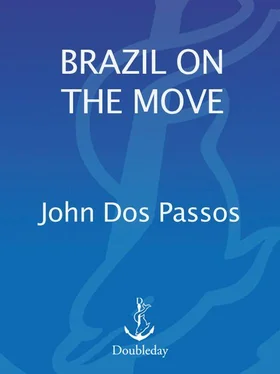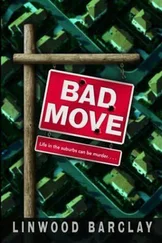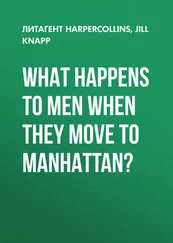It was a nostalgic expedition. Dr. Israél showed us the entrance to the beautiful house beside a small waterfall tumbling into a natural rock basin which he’d occupied as prefeito. The new prefeito lived there now. In the old days the place had been known by Dr. Israél’s initials: I.P. The new administration made out that it was named after a yellowflowered tree that grows along the watercourses, called in those parts the ipé .
One of the inconveniences of life in Brasília in the summer of 1962 was that the light and power almost inevitably would fail just about seven every evening. Some said it was because the officials of the state of Goiás who controlled the hightension lines from the Cachoeira Dourada (the Golden Waterfall) on the Paranaíba River, from which the power came, would pull the switch as a hint that the federal city better hurry up and pay its bills. Even at the efficient Hotel Nacional, guests would be trapped in the elevators and imprisoned for hours. The forewarned would avoid the elevators at this time of day and grope their way with candles down the unfinished stairways to the lobby.
The lights failed the very night Dr. Israél invited us to dinner. As it was a moonless night we had to find his house by the light of the Milky Way. He gave one of his snorting laughs as he met us with a candle. “You saw the new generators,” he said. “Come back a month from now and this won’t happen.”
VII
THE MOST DANGEROUS MAN
Campaign in the Grassroots
The first thing I saw when I stepped out of the hotel our first morning in Manaus was a curlyheaded young man in a doublebreasted caramelcolored suit. He was waving his arms and shouting in the middle of a crowd of market people and longshoremen. He was jumping up and down from sheer earnestness as he talked. He had a loudspeaker attached to his chest which seemed to be operated by a battery in the suitcase that lay at his feet. At first I thought he was selling patent medicine. It turned out he was a political candidate. Though it was early morning, the sun was hot. He’d already sweated through his doublebreasted suit. He was hoarse. His face was red. He was shouting so I couldn’t follow what he was saying except that his platform was to drive thieves and robbers out of the legislature of the state of Amazonas. I remember thinking: if he’s so hoarse and sweaty this early in the morning how is he going to last six weeks to election day?
The campaign of 1962, though only part of the federal congress, the state legislatures, and some governors were up for election, was one of the most hectic in Brazilian history. It looked as if politics had finally forged ahead of soccer. In Rio we found that something like seven hundred candidates were contesting fiftyseven seats, to be distributed according to proportional representation among thirteen parties, in the legislature of the new state of Guanabara. When the capital was moved to Brasília, the old federal district which comprised the area of the city of Rio de Janeiro became what the Cariocas like to call “the citystate” of Guanabara. The streets were so festooned with election posters you could hardly see the trees. A loudspeaker truck bellowed from every corner.
There were so many candidates they had been assigned numbers, like social security numbers.
A young man named Pedro Livio MacGregor — he got the name from a Scottish grandfather — who was a candidate for the Guanabara legislature, explained the electoral system to me. We were sitting at a table at the edge of the sunlight beside the wide swimmingpool in the courtyard of the Copacabana Palace Hotel. This is one of the spots in Rio where everybody meets everybody. Besides being a politician my informant was a Spiritualist minister.
The Brazilian Spiritas believe that they are in continuous communication with the dead; Jesus Christ in person continues to teach them from the other world. At their house of worship young MacGregor conducted a sort of settlement house for the favela dwellers, which included a clinic where doctors were available without charge. They distributed drugs and babyfoods free, along with advice as to how people should live their lives. “When they come, they know nothing,” he said, “they are like animals, we have to teach them to clean their teeth and to wash their faces.”
His enthusiasm for social service had induced him to run for office. As a Social Democrat (PSD), he relied heavily on the support of ex-President Kubitschek in his campaign.
Describing the elective system he emphasized the fact that really free elections were a novelty in Brazil. According to him the first was in 1955. Before that, particularly in the back country, people just took the ballots printed beforehand by the parties and handed out to them by the coroneles (the colonels), as the local bosses were called; and dropped them in the box. In 1955 official ballots were printed, as in the United States, on which the voter could mark his preference. This election of 1962 would be the first in which the printed ballot, with complete lists of candidates, would be practically nationwide. Another innovation would be that up to a certain date all parties would have free time in TV and radio.
“Everybody has agreed that this must be an honest election,” he said with fervor. He was a rather pale man with extremely lucid eyes. His eyes glowed with enthusiasm. “In spite of everything democracy advances.”
There is great fluidity about Brazilian politics as about everything else in that rapidly evolving country. Ever since the end of the Vargas regime the state governors have been increasing in importance. The first governor of Guanabara was Carlos Lacerda. His term still had two years to run. Although he himself was not a candidate for office, the fact that he is Brazil’s most accomplished anti-Communist made him the chief voice of the opposition against the candidacy for the federal chamber of deputies of a gentleman named Leonel Brizola who was about to retire as governor of the gaúcho state of Rio Grande do Sul.
In Brazil, as in England, you don’t have to be a resident of your constituency to run for offices in the national government. Although there were many local issues and local personalities involved, the underlying national issue of the campaign of 1962 was whether Brazil, in the so-called cold war, should incline towards Fidel Castro’s Cuba and the Communist powers, or towards the United States, and its Alliance for Progress program. Lacerda opposed the Communists. Brizola spoke their language. In our curious age, when, among the Western peoples whose institutions the Communists are undermining, anyone who vigorously opposes them is spoken of as a controversial figure, Lacerda has been, almost since boyhood, the most controversial of controversial figures in Brazilian public life.
It was in Washington that I first met Carlos Lacerda.
Ever since our uproarious motor trip into the hills of Minas Gerais in the days when driving a car in backcountry Brazil was a sporting proposition I’ve always had my face fixed for a laugh when I went to call on the Whites. By the fall of 1952 they had moved to Washington from Rio. This time I could hear Bill’s and Connie’s voices laughing inside when I rang the doorbell of their Georgetown apartment.
From the livingroom I could hear a voice with a foreign accent pronouncing the words: “Oopaylong Ca-seedy.” Immediately I was introduced to a tall strikingly handsome man. In one hand he was brandishing a pearlhandled cap pistol. A glittering holster was draped over one shoulder. Perched on his head above his shellrimmed glasses was a small boy’s cowboy hat.
The Whites explained him as a Brazilian journalist who had come to Washington to receive an award from the Inter-American Press Association. His English was fluent but erratic. His high spirits were catching. He shared our taste for the absurd. We all laughed our heads off about Oopalong Ca-seedy.
Читать дальше












